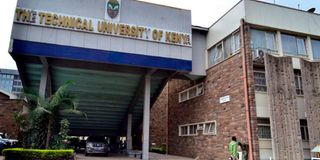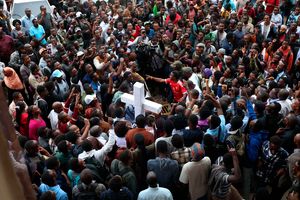
The Technical University of Kenya campus along along Haile Selassie Avenue in Nairobi was cosed indefinitely on February 3, 2025.
Titus Mwangi was overjoyed when he enrolled at the Technical University of Kenya (TUK) in September last year to pursue a bachelor's degree in Information Technology.
But six months later, he has yet to complete his first semester and has no idea when he will. He has barely been attended classes regularly because of the many strikes by lecturers. He has already used up the money given to him by the Higher Education Loans Board (Helb) to support him for one semester (four months).
The latest strike led to the indefinite closure of the university on February 3, 2025, just as students were about to start their exams. For Titus, life has taken a drastic turn, forcing him to take up a part-time job to make ends meet in Gachie, where he is staying with a relative while he awaits news of the university's reopening.
“I have never done any examination in that university. My academic flow as well as co-curriculum activities have been affected. I can count the number of classes that I have attended. This is not what I expected,” Titus said.
His continued stay at home has also been a matter of concern for his parents, who keep on asking him if the university has issued an update on the situation.
“When it was closed, I move to Gachie to stay with my relative. There was nothing to go home to. I’m now selling mitumba (second-hand clothes) just to raise a little money,” he said.
Zipporah Kasyoki, another student at TUK who has been residing in a bedsitter in Kangemi area, admits that life has been tough for her.
“For me it is just depression. I don’t know what is happening with our university and when we will resume,” said Zipporah.
The indefinite closure of the institution, has left many of the first and second year students, who were residing in the institution's hostels, with no option but to think of ways to survive in the city while others returned home. TUK has hostels to accommodate about 800 students whereas it has an enrolment of about 13,000, meaning that the majority of students rent outside the campus.
Raphael Oguk, the secretary-general of the Students Association of Technical University of Kenya (SATUK), is not only worried about the mental state of his colleagues, but also whether he will graduate this year as per the university calendar.
“We are supposed to graduate on November 26 this year. But you see now, the way the university calendar running, it might not be possible. If we resume learning by Monday next week, it means that we will start the second semester in April and run for the next three months,” Mr Oguk said.
According to him, the strike has taken up most of their time, which would have covered the first semester. However, the postponement of exams means that the remaining semesters will be affected, which will affect their plans. He confirmed that students are now engaged in manual labour, including working on construction sites, to make ends meet.
A meeting scheduled for Wednesday to sign a return-to-work formula between the Ministry of Education and the Universities Academic Staff Union (Uasu) was cancelled after union officials failed to turn up at Jogoo House. They later told the Nation that they had not yet reached an agreement and accused the government side of mischief.
If the striking lecturers sign a return-to-work agreement, fourth year students, who are due to graduate this year, may be forced to shorten their industrial attachment and clearance periods.
Both the industrial attachment and clearance periods last around seven months, meaning that if the university sticks to the November graduation date, some of them could be excluded from the list due to clearance.
The second option is to postpone graduation until next year, which will also have negative consequences for the students.
Pascal Juma, the academic secretary of SATUK, called on both the Ministry of Education and the striking staff to prioritise their talks so that students can resume their studies.
“Many students were close to completing their studies, and now they face delays or uncertainty about their graduation. This affects their career prospects and job opportunities. Parents and guardians who sacrificed to pay fees now face financial burdens, especially if refunds are not issued or if they need to fund alternative education plans,” Mr Juma said.
He also said that some of the students have been engaging in activities such as drug abuse after being idle for a month. This is most prevalent in private hostels within the city, where students reside but now have nothing to do.
“We are feeling like we have wasted our resources. We usually pay rent based on the semesters, like now, the semester has been running from September last year, and with the closure we were left with no option but to move to houses that we can afford,” said Austin Odhiambo.
Echoing the same sentiments, Milly Kigweru admitted that life has been difficult for them since the closure of the university and it is disheartening that there is no solution in sight.
“Students waiting for their attachments will miss out on their attachment opportunities because of the same. Our future is at stake because of the ongoing strike. We plead with the ministry to look into this matter,” Ms Kigweru said.









